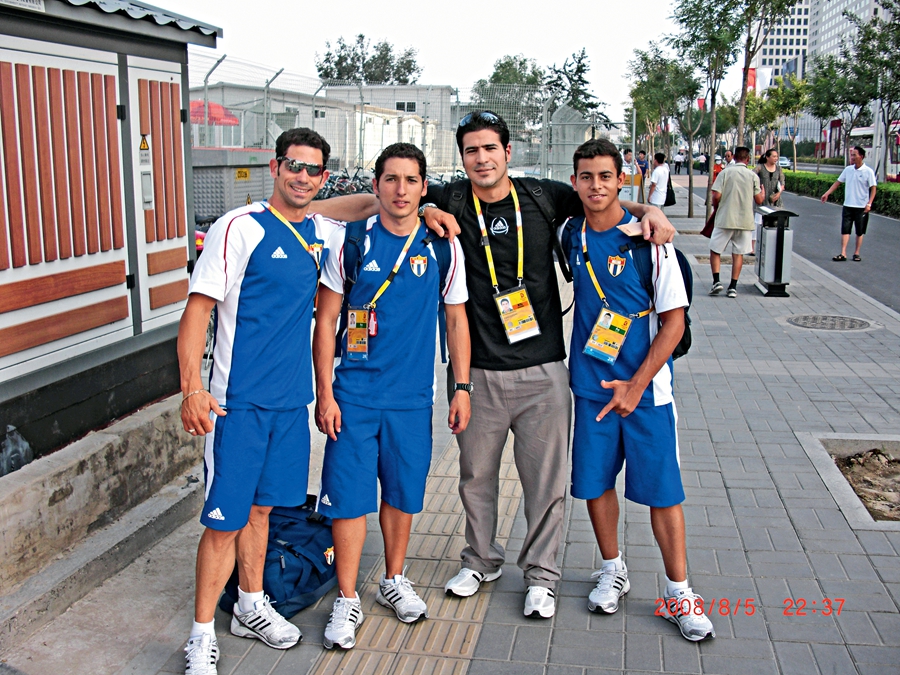By staff reporter ABEL ROSALES GINARTE
By staff reporter ABEL ROSALES GINARTE
DAVID Ramírez Valdés is the star presenter and commentator on sports topics on the Chinese Global Television Network (CGTN), with multilingual service in Beijing. Since August 2010, this Cuban journalist has worked at CGTN, but his time in China goes back more than a decade. “I initially came to China to study Chinese at Beijing International Studies University in July 2007.”
His passion for swimming began at age five. His naive desire to learn to swim led him to become a full-time athlete. He was part of Cuba’s national swimming team in the mid-1990s and although a cervical injury abruptly ended his professional career, by then he knew that his “sentimental attachment to sport was not temporary.”

Ramírez with Cuban divers at the 2008 Beijing Olympics.
In 2005, he graduated with a degree in communications from the University of Havana, with the aspiration to alternate between advertising and sports journalism. After two years’ working at the Cuban Institute of Radio and Television (ICRT), an agreement between Cuba and China connected him definitively with the Asian dragon. “The idea was for professionals from Cuban ministries to come to China and after we improved our Chinese language proficiency, we would strengthen exchanges between institutions in both countries.”
An important event that was about to take place in China became his immediate professional goal. “It was 2007 and we thought that with a year of Chinese training I was going to be the translator for the Cuban ICRT delegation at the Beijing Summer Olympics, I’m the one,” he laughed. They were days of great emotions that Ramírez enjoyed intensely. “My whole life, I’d always dreamed of going to the Olympic Games and doing so was such a unique experience. A sports enthusiast like me dreams of seeing the finals of these four-year events, to see Michael Phelps winning eight gold medals and surpassing the feat of Mark Spitz of Munich ‘72, or Usain Bolt literally pulverizing the world records in the 100 and 200 meters, they are imperishable images forever in my personal archive.”
Towards Big Goals
However, despite all his enthusiasm, he had mixed feelings. “The members of my delegation asked me for help as a translator and I could barely help them, much less with the technical issues of television broadcasts.” Chinese is a language that requires a lot of time, its methodical manner of study is based on the repetition of characters to the point of exhaustion and in a teaching supported by memorization, which can become martyrdom for speakers of Romance languages. “I explained to my colleagues that two semesters were barely enough to master elementary communication in Chinese, but it was hard for them to believe me.”
After the Olympic Games, he continued studying at the university for another two years. “I am convinced that the will that I forged in my athlete days helped me a lot in those hours of endless boredom writing characters. It was similar to swimming in a pool for more than two hours, eight or 10 kilometers, seeing only one line black drawn in the background and the “T” on the walls, but aware that sacrifice was the only way – there are no shortcuts to the big goals.” Despite extensive effort, he does not consider his level of Chinese to be so good: “Sadly I can’t compare it with my knowledge of English or French, I admit that I have been a little lazy from time to time”.

Ramírez is the star presenter and commentator on CGTN.
After completing his language studies in Beijing, he took exams to enter the Spanish-language channel of Chinese television. “After that, I returned to Cuba and with the support of the National Union of Writers and Artists of Cuba, I returned to Beijing to work as a news editor.” Four years later, he began to present the space dedicated to sports, coinciding with the 2014 Brazil World Cup. “Since then, I have a fixed segment twice a day, in which we prioritize the performances of athletes and teams from China and Latin America.”
Although somewhat reluctant to talk about his successes in the channel, Ramírez recognizes that he has managed to diversify the sports menu of the news. “Before, we basically talked about football, tennis, diving, badminton, and table tennis, without giving the tournaments an immediate daily follow-up.” Currently, in addition to having won in frequency and immediacy, regularly reporting on Chinese basketball (the CBA) and the NBA, baseball, boxing fights or mixed martial arts have become more important, among other topics of interest.
The Strength of Chinese Sports
Currently, Chinese athletes have achieved a prominent role in international events. “In addition to the sports in which they have traditionally cemented hegemony – table tennis, diving, badminton, and gymnastics – they have also been included in the elite of many others.” Remember that almost no one is surprised about China’s successes in women’s volleyball and soccer, swimming, weightlifting, cycling, fencing, athletics, judo, tennis, or boxing. “In the years that I have lived here, I have seen how athletes of those sports, somehow marginalized by the media, have won the celebrity category that was reserved for stars like Li Ning in gymnastics or Fu Mingxia in dives.”
Ramírez pointed out that the 2008 Olympic Games represented China’s definitive leap as a world sports power, which will also end up experimenting in winter sports. “After the Olympic Winter Games in Pyeongchang will be those of Beijing 2022, which, with almost total certainty, will be a before and after in the history of sports in China, as it was at the 2008 Summer Olympics in Beijing.” Given his experience as a sports analyst, Ramírez dares to predict that, “the Chinese delegation will be included in the top five of the medal table and will maintain that category in the future.”
During all these years, Ramírez feels that he has grown professionally thanks to his Chinese and foreign colleagues in CGTN in the Spanish department, and his desire to overcome difficulties. “It has been a process of constant learning, mainly in an attempt to unify the language we use. In an international channel, one must get rid of localisms and be obsessive with pronunciation to meet the demands of a multinational audience.”
He has visited many places in China to enjoy its landscapes and get closer to its millenary culture and history. “One life is not enough to know China; it would be nonsense to list the places that have impressed me because the list is very extensive.” During all these years, he has been aware that to understand the Chinese, one must enter into their past. “Living in China allows you to contrast the impact of the rapid economic development in a society with deep-rooted cultural customs, which is a fascinating contradiction between modernity and tradition,” said Ramírez.
In March 2012, Ramírez found the love of his life in Beijing. “My wife is Russian, a fashion designer, from a city called Magnitogorsk, next to the Ural Mountains, and we got married on February 14, 2014.” His excellent voice and the knowledge achieved over years augur a promising future.